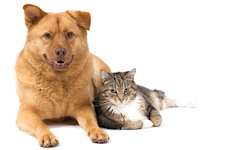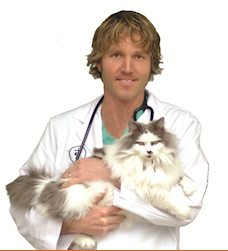 |
You are receiving this e-mail as a part of your subscription to Dr. Jones' newsletter, 'Veterinary Sec.rets'. See subscription information below. |
| |
|
 Hello Friend, Hello Friend,
In caring for your pet at home, you need to have some basic veterinary skills.
If your dog or cat is to become ill, one of the FIRST things to happen is for them to STOP drinking.
And become DEHYDRATED.
You need to know HOW to tell if they are dehydrated, and HOW to treat the dehydration.
Here is some of WHAT you will find in my Inner Circle at:
http://www.theonlinevet.com/inercircle.php
---------------------------
Drinking / Dehydration
---------------------------
It is of utmost importance for your pet not to become dehydrated.
The Skin
The first test for dehydration is ‘tenting’ the skin. Pinch the skin between your pet’s shoulder blades and see how quickly it springs back. It should go back in less than 5 seconds. If the skin tent is prolonged, then your pet is dehydrated.
The Eyes
Your pet’s eyes will be sunken into their head. Specifically, the eyes recede into the eye socket. It is often seen with dehydrated cats.
Capillary Refill
Your pet’s gums are the best indicator of dehydration. Lift your pet’s lips to expose the gums (pink tissue above the teeth). Place your index finger on the gums and press your finger flat to the gum. This temporarily squeezes blood in that spot out of the small blood vessels (capillaries). When you lift your finger, the blood should return in less than 2 seconds. This response will be delayed in a dehydrated pet.
Gum moisture
The gums often feel dry and tacky in a dehydrated pet. When you pull your index finger away from the gums, it should feel wet, and easily slide away. In a dehydrated pet, your finger will stick to the gums.
-------------------------
Possible solutions
-------------------------
TO YOUR VET
If your dog or cat is seriously ill and dehydrated, this warrants a veterinary exam. Your veterinarian can at least give you a suspected diagnosis, and determine if this warrants home care.
ON THE ROCKS
Some dogs will readily lick ice cubes when they are dehydrated, even if they are reluctant to drink water. Float the ice in their water bowl.
SQUIRT IT IN
Pets that are more severely dehydrated will benefit from additional electrolytes. ‘Pedialyte’ is an oral electrolyte re-hydration supplement for children. A needle-less syringe or a turkey baster works well. Insert the tip into the center of your pet’s mouth. Tilt his head back, hold his mouth closed and squirt in the fluid.
A safe rule of thumb is to give 30 ml (2 tablespoons) per 10 lbs of weight every hour.
P.S. You should start with my Inner Circle called Basic Home Veterinary Care. In practice I often thought that many a sick dog and cat could have had BETTER care by their owners at home.
What do you think happens after the clinic closes?
Your pet is ALONE.
Most practices DON'T have 24 hour care.
Learn HOW to care for your pet at home here:
http://www.theonlinevet.com/innercircle.php
Heal Your Pets At Home!
Best Wishes,
Dr Andrew Jones

DISCLAIMER: This information is for educational purposes only and is not intended to replace the advice of your own veterinarian. Dr Andrew Jones resigned from the College of Veterinarians of B.C. effective December 1 2010, meaning he cannot answer specific questions about your pet's medical issues or make specific medical recommendations for your pet.
PRIVACY POLICY: We will never rent, sell, loan, provide, barter, exchange or in any way make available your personal information to others. You can unsubscribe or change your email address at any time using the links at the bottom of this email.
Copyright 2010 Four Paws Online Ltd.
Tel: 1-800-396-1534
Fax: 1-888-398-1378
www.veterinarysecretsrevealed.com
support@veterinarysecretsrevealed.com
|
|
|
|